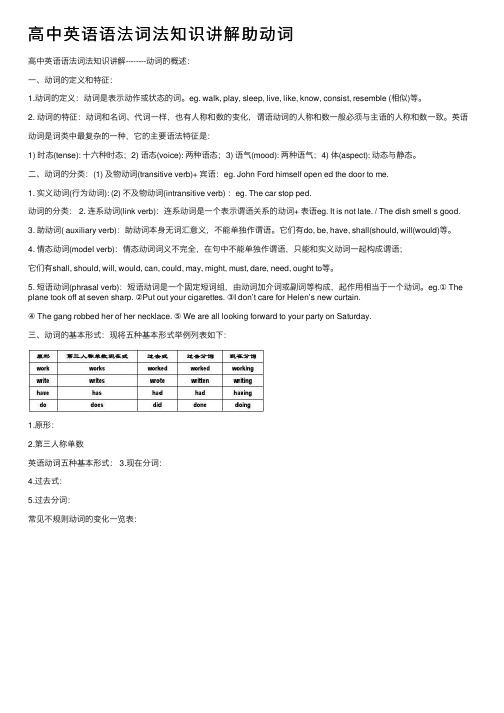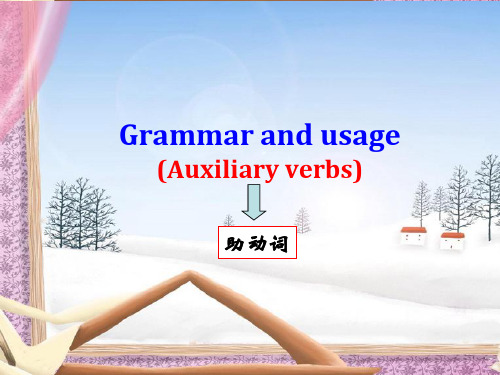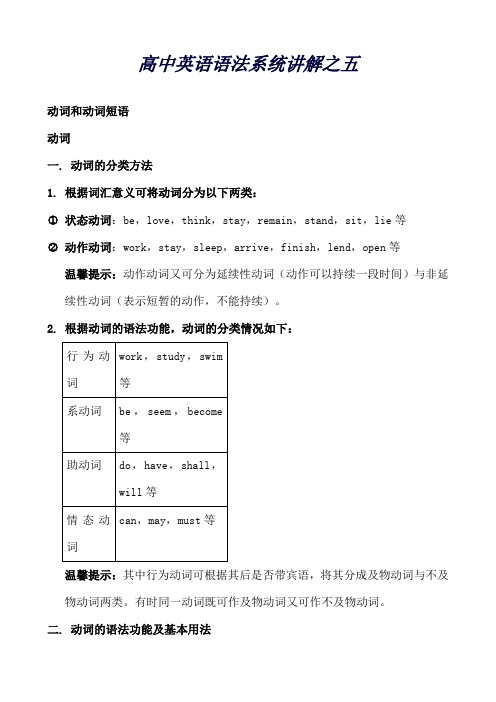2013届高三英语语法讲解 专题5 助动词
高中英语语法词法知识讲解助动词

⾼中英语语法词法知识讲解助动词⾼中英语语法词法知识讲解--------动词的概述:⼀、动词的定义和特征:1.动词的定义:动词是表⽰动作或状态的词。
eg. walk, play, sleep, live, like, know, consist, resemble (相似)等。
2. 动词的特征:动词和名词、代词⼀样,也有⼈称和数的变化,谓语动词的⼈称和数⼀般必须与主语的⼈称和数⼀致。
英语动词是词类中最复杂的⼀种,它的主要语法特征是:1) 时态(tense): ⼗六种时态;2) 语态(voice): 两种语态;3) 语⽓(mood): 两种语⽓;4) 体(aspect): 动态与静态。
⼆、动词的分类:(1) 及物动词(transitive verb)+ 宾语:eg. John Ford himself open ed the door to me.1. 实义动词(⾏为动词): (2) 不及物动词(intransitive verb) :eg. The car stop ped.动词的分类: 2. 连系动词(link verb):连系动词是⼀个表⽰谓语关系的动词+ 表语eg. It is not late. / The dish smell s good.3. 助动词( auxiliary verb):助动词本⾝⽆词汇意义,不能单独作谓语。
它们有do, be, have, shall(should, will(would)等。
4. 情态动词(model verb):情态动词词义不完全,在句中不能单独作谓语,只能和实义动词⼀起构成谓语;它们有shall, should, will, would, can, could, may, might, must, dare, need, ought to等。
5. 短语动词(phrasal verb):短语动词是⼀个固定短词组,由动词加介词或副词等构成,起作⽤相当于⼀个动词。
英语助动词详解

助动词助动词:顾名思义,就是帮助真正的实义动词完成一定的语法意义和情态意义,它们本身没有意思,分为基本助动词和情态助动词。
基本助动词:1, be动词(be/been/being/am/is/are/was/were);2, do/does/did;3, have/has/had这些基本助动词后面可以用的动词形式见下表:e.g. They are investigating the cause of the accident. 他们正在调查那件事故的起因。
(现在进行时)He was cycling home when he ran into a strange man. 他正在骑车回家的时候遇到了一个奇怪的人。
(过去进行时)We will be lying on the beach this time next Sunday. 下周的这个时候我们将正躺在沙滩上。
(将来进行时)I have been waiting for nearly an hour at the café. 我在咖啡厅等了将近一小时了。
(现在完成进行时)e.g. Do you go hiking every weekend? 你每周末去远足吗?(一般现在时,疑问句)She doesn’t enjoy living in the noisy city. 她不喜欢住在喧闹的城市。
(一般现在时,否定句)Did they finish the project on time? 他们准时完成那个项目了吗?(一般过去时,疑问句)He did n’t have a clue about what had happened. 他完全不清楚发生了什么。
(一般过去时,否定句)e.g. They haven’t reached an agreement on the matter. 他们还未就这件事达成一致意见。
(现在完成时)The wedding had finished when he finally got there. 当他最终赶到的时候,婚礼已经结束了。
英语助动词PPT课件

• I don’t like Endgol,isdho.es, did + v.原 • He doesn’t do his homework at night. • We didn’t clean the room yesterday.
-
16
Exercise
• 我们是同班同学。 • 他是我的同班同学。 • 我是他的同班同学。
China? 3、与not合用,构成否定句 I don’t want to visit that farm. They haven’t finished the work yet.
-
15
助动词do
• 根据时态、主语人称、数的变化, do/ does/ did,
• 一称般单现数在),时do:用d于o,其注do他意es人(用称于,第三人
动词 形式
原形
三单式
现在 分词
过去式 -ed
过去 分词 -ed
do does doing did done
-
1
系动词
• 也叫连系动词。系动词本身有含义, 但它不能单独做谓语,后面必须接表 语,用来说明主语的状况、性质、特 征等。一起构成主系表结构。
•表语: 由形容词、名词、介 词短语担任
-
2
系动词
-
10
shall
• shall 常用于第一人称,用在问句中表 示:征求意见
• Shall we go to the supermarket this weekend?
-
11
should
• should 表示“应该” • We should speak to the old people
politely. (adv. 有礼貌地)
高中英语语法——助动词(28张PPT)

助动词词组有…… 等。
1. have(got)to 不得不 2. had better 最好 3. would sooner/rather…than 宁愿 4. be to 将要,应该 5. be likely to 很有可能 6. be supposed to 理应该 7. used to 过去常常 8. be about to 正要去 9. be able to 能够
They are having a meeting.
b. 英语现在越来越重要。
English is becoming more and more important now. 2) be + 过去分词,构成_被__动__语__态___。 a. 窗户是汤姆打碎的。
The window is/was broken by Tom. b. 世界各地都教英语。
would sooner/rather…than, be to, be
likely to, be supposed to, used to, be about to, be able to等。
助动词用法要点
Tip 1: 除情态助动词之外,其他助动词可 以有多个同时出现在谓语中。
1. I will be speaking against the Internet. 2. Too much information has not been evaluated. 3. More measuressshhoouullddbbee taken to deal with
information on the Internet. 3. We have known the truth. 4. I shall be there at 8 o’clock. 时态助动词有be(am, is, are; was, were), have(has, had), will(would), shall(should),无意义。
高中英语语法系统讲解之五动词和动词短语

高中英语语法系统讲解之五动词和动词短语动词一. 动词的分类方法1. 根据词汇意义可将动词分为以下两类:○1状态动词:be,love,think,stay,remain,stand,sit,lie等○2动作动词:work,stay,sleep,arrive,finish,lend,open等温馨提示:动作动词又可分为延续性动词(动作可以持续一段时间)与非延续性动词(表示短暂的动作,不能持续)。
2. 根据动词的语法功能,动词的分类情况如下:温馨提示:其中行为动词可根据其后是否带宾语,将其分成及物动词与不及物动词两类。
有时同一动词既可作及物动词又可作不及物动词。
二. 动词的语法功能及基本用法动词在句中起两种作用,即:作谓语和非谓语。
动词作谓语,必须与主语在人称和数上保持一致,具有表示时态、语态、语气等方面的语法特征。
She sings very well. She wants to learn English well.Seeing is believing. We’re thinking of making a new plan for the next term.三. 连系动词的用法1. 状态系动词只有be一词。
如He is a teacher.2. 持续系动词继续保持一种状况或态度,主要有keep,rest,remain,stay,lie,stand。
如He always kept silent at meeting. This matter rests a mystery.3. 表像系动词“看起来像”,主要有seem,appear,look。
如He looks very tired. He seems (to be) very sad.4. 感官系动词feel,smell,sound,taste。
如This kind of cloth feels very soft. This flower smells very sweet.5. 变化系动词become,grow,turn,fall,get,go,come,run。
英语语法知识讲解:助动词和情态动词

英语语法知识讲解:助动词和情态动词
1.助动词:辅助其他动词构成时态、语态、疑问句式、否定名式的动词。
助动词有些词义,有些没有词义,或者暗含一点词义。
放在谓语首位置助动词会受主语人称、数的限制,其他位置不会受限制。
2.英语中有19个助动词:
do does did
shall will should would
have has had having
be am is are was were been being
3.情态动词:放在谓语动词的首位,辅助其他动词构成谓语,给谓语增加“可以,愿意,能够,应该,必须”等意思。
情态动词的性质、作用与助动词相同,除了给谓语增加一点意思外,还代替助动词与其他动词构成疑问句式和否定句式。
但它们没有人称、数的变化,并且只能用在谓语中,不能用于为以外的成分中。
4.英语的情诚动词有:
5.助动词和情态动词的对比:
本文作者:丹丹英语(公众号:英语语法学习)
英语语法知识讲解:助动词和情态动词1.助动词:辅助其他动词构成时态、语态、疑问句式、否定名式的动词。
助动词有些词义,有些没有词义,或者暗含一点词义。
放在谓语首位置助动词会受主语人称、数的限制,其他位置不会受限制。
2.英语中有19个助动词:do does did shall w 推荐度:点击下载文档文档为doc格式。
2013高考必备 高中英语语法精品资料 句子结构和成分

1.Most birds canfly.()
2.The children areflyingkites in the park. ( )
3.Ithappenedyesterday.()
4.My watchstopped.()
5.The babystoppedcrying when he saw his mother. ( )
(open后面没跟宾语,此时,open是不及物动词。)
Heopenedthe door.
(open后面有宾语the door,此时,open是及物动词)
注意:英语中一个动词是及物动词还是不及物动词,关键是看它用在句中时后面是否跟宾语。
1有些动词既可作及物动词又可作不及物动词,词义相同。如:
英语语法助动词 ppt课件

分类及简介 助动词分为:基本助动词,情态助动 词,半助动词。 基本助动词:be,do,have 情态助动词:shall, will, should, would,could 半助动词:以be为中心成分,以have 为中心成分,以seem为中心成分。
ppt课件 3
一、基本助动词
ppt课件 13
(6)固定词组
May well+do意为“理应有足够的理由” May/might as well+do 用来建议或劝说某人采取是 某种行动。意为“还不如,不妨” He may well be proud of his son. 他大可以以他的儿子为荣。 He might as well throw your money into the sea as lend it to him. 借钱给他还不如把钱扔到海里。 注意:
助动词
ppt课件
1
什么是助动词? 协助主要动词构成谓语动词词组的词叫助 动词(Auxiliary Verb)。被协助的动词称 作主要动词(Main Verb)。 助动词自身没有词义,不可单独使用。如: He doesn't like English.他不喜欢英语。 (doesn't是助动词,无词义;like是主要 动词,有词义)
may较正式,而can口语化。 May (might) I speak to you for a moment, professor? Can(could) I have a cup of tea,mom? d) could 有时也可表示推测,因此三者可以互换。 He may/might/could br at the conference. e) may not 表示不可能时,重音落在may上。 May not表示不许可时,重音落在否定词上。 因此在书面语中,为防止歧义,表示不可能用can’t
- 1、下载文档前请自行甄别文档内容的完整性,平台不提供额外的编辑、内容补充、找答案等附加服务。
- 2、"仅部分预览"的文档,不可在线预览部分如存在完整性等问题,可反馈申请退款(可完整预览的文档不适用该条件!)。
- 3、如文档侵犯您的权益,请联系客服反馈,我们会尽快为您处理(人工客服工作时间:9:00-18:30)。
一.概念:
助动词是帮助主要动词构成各种时态,语态,语气以及否定或疑问结构的动词.助动词分为时态助动词和结构助动词两种.
二.要点精讲:
1. 助动词be的用法
说明:这种用法也可以说成是一种将来时态表达法。
b. 表示命令。
例如:
You are to explain this. 对此你要做出解释。
He is to come to the office this afternoon. 要他今天下午来办公室。
c. 征求意见。
例如:
How am I to answer him? 我该怎样答复他?
Who is to go there? 谁该去那儿呢?
d. 表示相约、商定。
例如:
We are to meet at the school gate at seven tomorrow morning. 我们明天早晨7点在校门口集合。
2. 助动词have的用法
3.助动词do 的用法
1)构成一般疑问句。
例如:
Do you want to pass the CET? 你想通过大学英语测试吗?
Did you study German? 你们学过德语吗?
2)do + not 构成否定句。
例如:
I do not want to be criticized. 我不想挨批评。
6)用作代动词。
例如:
---- Do you like Beijing? --你喜欢北京吗?
---- Yes, I do. --是的,喜欢。
(do用作代动词,代替like Beijing.)
He knows how to drive a car, doesn't he? 他知道如何开车,对吧?
4. 助动词shall和will的用法
shall和will作为助动词可以与动词原形一起构成一般将来时。
例如:
I shall study harder at Engl ish. 我将更加努力地学习英语。
He will go to Shanghai. 他要去上海。
说明:在过去的语法中,语法学家说shall用于第一人称,will 只用于第二、第三人称。
现在,尤其是在口语中,will常用于第一人称,但shall只用于第一人称,如用于第二、第三人称,就失去助动词的意义,已变为情态动词,试比较:
He shall come. 他必须来。
(shall有命令的意味。
)
He will come. 他要来。
(will只与动词原形构成一般将来时。
)
5.助动词should, would的用法
1)should无词义,只是shall的过去形式,与动词原形构成过去将来时,只用于第一人称。
例如:
I telephoned him yesterday to ask what I should do next week. 我昨天给他打电话,问他我下周干什么。
比较:"What shall I do next week?" I asked. "我下周干什么?"我问道。
可以说,shall变成间接引语时,变成了should。
2) would也无词义,是will的过去形式,与动词原形构成过去将来时,用于第二、第三人称。
例如:
He said he would come. 他说他要来。
比较:"I will go," he said. 他说:"我要去那儿。
"变成间接引语,就成了He said he would come。
原来的will变成would,go变成了come.。
6. 短语动词
动词加小品构成的起动词作用的短语叫短语动词。
例如:
5.______ you think he ______ back by dinner time?
a. Do/have come
b. Did/will have come
c. Does/will come
d. Do/will have come
6.He said that he dropped his bag when he ______ for the bus.
a. was runing
b. was running
c. were running
d. is running
7.No sooner ______ he arrived home than he ______ to start on another journey.
a. has/was asked
b. have/were asked
c. had/is asked
d. had/was asked
8.“______ you give m e a room for the night?” I asked on arriving at the hotel.
a. Should
b. Can
c. Might
d. May
14.I hoped ______ my letter.
a. her to answer
b. that she would answer
c. that she answers
d. her answering
15.He ______ live in the country than in the city.
a. prefers
b. likes to
c. had better
d. would rather
16.______ to see a film with us today?
a. Did you like
b. Would you like
c. Will you like
d. Have you liked
17.I’m sorry, bu t I had no alternative. I simply ______ what I did.
a. must do
b. had to do
c. ought to have done
d. have to do
18.“Time is running out,______?”
a. hadn’t we better got start
b. hadn’t we better get start
c.hadn’t we better get star ted
d. hadn’t we better not started
19.No one ______ that to his face.
a. dares say
b. dares saying
c. dare say
d. dare to say
20.The students in the classroom ______ not to make so much noise.
a. need
b. ought
c. must
d. dare
21.You ______ last week if you were really serious about your work.
a. ought to come
b. ought to be coming
c. ought ha ve come
d. ought to have come
22.The elephants ought ______ hours ago by the keepers.
a. to be fed
b. to feed
c. to being fed
d. to have been fed
23.“I wonder why they’re late.”“They ______ the train.”
a. c an have missed
b. could miss
c. may have missed
d. might miss
24.“Tom graduated from college at a very young age.”
“He ______ have been an outstanding student.”
a. must
b. could
c. should
d. might
25.You ______ the examination again since you had already passed it.
a. needn’t have taken
b. didn’t need to take
c. needn’t take
d. mustn’t take
26.He is really incompetent! The letter ______ yesterday.
a. should be finished typing
b. must be finished typing
c.mus t have finished typing c. should have been finished typing
27.The boy told his father that he would rather ______ an astronaut.
a. become
b. to become
c. becoming
d. became。
